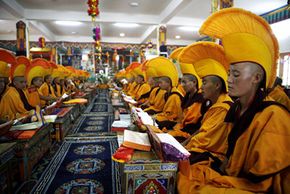
Natural life is cyclical. Day fades into night and turns back into day as the sun rises. One season gradually gives way to the next. Over the passage of time, new generations are born and old ones die. The continuous succession of birth, death and rebirth permeates nature even though our own lives seem linear. So it's no surprise that some ancient observers looked at the seeming linearity of human existence and decided that life, like the natural world, might actually be more cyclical than linear. Multiple religions, philosophies and movements adopted this belief in cyclic life, or reincarnation.
Religion Image Gallery
Advertisem*nt
Reincarnation, also called transmigration or metempsychosis, is the concept that the soul, or some aspect of the soul, is reborn into new lives. Depending on the religion or philosophy, the soul can appear incarnate in humans, animals or plants as it works its way toward an eventual escape from the cycle of birth, death and rebirth. Most religions that believe in reincarnation consider it the path to purity and salvation.
Reincarnation is widely accepted by the major Eastern religions -- most prominently Hinduism and Buddhism. It also has a history in ancient Greek philosophy. However, for people more familiar with the major monotheistic religions -- Christianity, Judaism and Islam -- the idea of reincarnation seems foreign and maybe even a little strange. That's because Christianity, Judaism and Islam conceive of time linearly. Life is simply a short step that determines the quality of an afterlife. For those who believe in only one life followed by an eternal afterlife, reincarnation is like an unwieldy marathon run by relay instead of a short, concise sprint.
The Goddess Lakshmi and the Parasitic Twin
In November 2007, a 2-year-old Indian girl born with four arms and four legs underwent surgery to remove her extra limbs. As a fetus, the girl absorbed her nondeveloping twin-- taking on its appendages and kidneys. Some villagers believed the child was a reincarnation of the four-armed Hindu goddess Lakshmi, after whom she was named [source: AP].
Advertisem*nt
Contents
- Reincarnation in Hinduism
- Reincarnation in Buddhism
- Reincarnation in the Ancient Western World
- Reincarnation in Science
Reincarnation in Hinduism

The Hindu religion is vast and varied. Its adherents worship an array of gods and celebrate diverse traditions. Yet Hinduism, the world's oldest surviving religion, is unified by its acceptance of samsara, a chain of births and deaths linked by reincarnation. Controlling samsara is the law of karma. Hindus believe that all individuals accumulate karma over the course of a lifetime. Good actions create good karma and evil actions create negative karma. Karma is not assigned or regulated by any god; it's simply earned by an individual and passed down through subsequent lives.
But while good karma can eventually earn a person a higher place in the caste system in a future life, the ultimate goal of any Hindu adherent is moksha, or salvation from samsara. Moksha is the final of four primary Hindu goals. The first three -- kama, artha and dharma -- concern earthly pursuits like pleasure, power or well-being and virtue.
Advertisem*nt
Ironically, to achieve moksha, you must make a deliberate effort to not want it. Salvation comes only after a person has abandoned all pursuits and desires and accepts that the individual soul is the same as Brahman, the universal soul or god. By exiting the cycle, an individual no longer endures the pain and suffering of earthly existence performed countless times over.
The belief in reincarnation is also predominant in two prevalent religions from India: Jainism and Sikhism. Jain adherents believe the soul accumulates karma as an actual physical substance, unlike the conceptual Hindu idea of karmic law. As long as the soul is burdened by karmic particles, it must bind with a body, initiating a series of rebirths. Only when a soul is free from all karma can it exit the cycle of reincarnation and join other disembodied souls in a state of perfection. However, because Jain followers believe that deliverance is currently impossible, devoted adherents simply pursue purification.
Sikhism also teaches reincarnation. Like Hinduism, the law of karma influences the quality of Sikh life. For Sikhs to exit the cycle of birth and rebirth, they must achieve complete knowledge and become one with God.
The Wheel is Turning
Jains compare time to a wheel with six spokes. The wheel's first three spokes represent Jainism's golden age; the final three spokes represent the religion's decline and eventual extinction before rebirth. Because we are currently in the period of decline -- between the fifth and sixth spokes -- Jain adherents believe that it is currently impossible to reach enlightenment.
Advertisem*nt
Reincarnation in Buddhism

When Buddhism was established 2,500 years ago, it incorporated the Hindu belief in reincarnation. Although Buddhism has two major subdivisions and countless variations in regional practices, most Buddhists believe in samsara or the cycle of rebirth. Samsara is governed by the law of karma: Good conduct produces good karma and bad conduct produces evil karma. Buddhists believe that the soul's karma transmigrates between bodies and becomes a "germ of consciousness" in the womb [source: Encyclopaedia Britannica]. Periods of afterlife, sometimes called "the between," punctuate samsara, coming after death and before rebirth [source: NPR].
Like Hindus, Buddhists see unenlightened samsara as a state of suffering. We suffer because we desire the transient. Only when we achieve a state of total passiveness and free ourselves from all desire can we escape samsara and achieve nirvana, or salvation. Many Buddhists believe an individual can end the cycle of reincarnation by following the Eightfold Path, or middle way. An enlightened being embodies the directives of the Eightfold Path: correct view, correct intention, correct speech, correct action, correct livelihood, correct effort, correct mindfulness and correct concentration.
Advertisem*nt
The Buddha Siddhartha Gautama taught the Eightfold Path in his first sermon after attaining enlightenment. Siddhartha, who was born around 563 B.C. near modern-day Nepal, had an extravagant and privileged youth. As a young man, he began to question his spiritual state amid such luxury and reverted to the life of an extreme ascetic. When his hermitic life brought him no closer to enlightenment, Siddhartha decided to pursue the middle way -- a state of existence between excess and self-deprivation. Shortly thereafter, Siddhartha reached enlightenment.
Reincarnation in the Ancient Western World

Although belief in reincarnation is a predominant element of many Eastern religions, it also was taught in the ancient Western world. Mystery religions, which sometimes transformed into secularized social clubs or fraternities, espoused a wide range of reincarnation ceremonies and beliefs. Some of these early Greco-Roman religions eventually influenced the philosophy of famous thinkers like Plato.
Orphism was a popular mystery religion beginning in the sixth or seventh century B.C. Its followers studied the supposed writings of Orpheus, a legendary musical figure. They believed in a soul that withstood death and could appear incarnate in human or mammalian form. Orphics thought the soul was divine and was imprisoned by the body. By leading a correct life and abstaining from meat, wine and sex, a soul could go to Elysium, a paradise after death; an evil soul would suffer punishments in hell. But neither afterlife was eternal and after a time, the soul would be reborn into a new body. Only after passing through three good Orphic lives could a soul end the cycle of reincarnation.
Advertisem*nt
The Orphic interest in death and the afterlife influenced the Pythagorean brotherhood, another mystery society based in southern Italy. The philosopher and mathematician Pythagoras, who is associated with the brotherhood, believed the soul could appear incarnate in a human or animal's body. This belief led to his espousal of vegetarianism. The fraternity taught that the soul originated among the stars but fell to earth and joined with the human body. Pythagorean followers combined their religious theorizing with the studies of astronomy, music and, of course, geometry.
The philosopher Plato also believed that the soul was repeatedly reincarnated. Plato suspected that seven planetary spheres and an eighth sphere of fixed stars surrounded the Earth. The divine lay beyond the eighth sphere and set the universe into motion. Souls came from the planets, descended to earth, united with bodies and then tried to free themselves and reascend to the stars.
Don't Look Back
The mythological figure of Orpheus possessed immense musical talent. His poems and songs could charm people, animals and even trees and other inanimate objects. But when his wife Eurydice was killed by a snake, Orpheus's desire to bring her back from the dead made him set out to charm a god. He descended into the underworld, played for Hades and pleased the god with his music. Hades allowed Eurydice to return to life but set one condition: As Orpheus led Eurydice out of the underworld, he could not look back. As the couple reached the surface, Orpheus turned for a glimpse of his wife, only to see her tumbling back into the world of the dead.
Advertisem*nt
Reincarnation in Science

Although reincarnation seems conventional to the more than1.25 billion practitioners of Hinduism and Buddhism, it's not widely accepted by those outside of Eastern religion. The Western skepticism of reincarnation is tied to monotheistic religions' focus on a single life, a single soul and an active God who does not rely on karmic law. And with sporadic believers announcing they're Cleopatra or Elvis reincarnate, it's not surprising many people remain extremely skeptical of the soul's ability to return repeatedly.
However, this general skepticism has not prevented researchers from exploring the potential for reincarnation. Dr. Ian Stevenson, an academic psychiatrist, led the study of reincarnation in the United States until his death in 2007. Stevenson founded the Division of Personality Studies under the University of Virginia's department of psychiatry and neurobehavioral sciences. The lab, which later became known as the Division of Perceptual Studies, focuses on examining children who remember former lives, near-death experiences, apparitions and after-death communications, out-of-body experiences and deathbed visions.
Advertisem*nt
Stevenson, who often called reincarnation the "survival of personality after death," saw the existence of past lives as a potential explanation for the differences in human condition [source: New York Times]. He believed past experiences plus genetics and the environment could help elucidate gender dysphoria, phobias and other unexplained personality traits.
Stevenson's reincarnation studies focused on young children, usually between the ages of2 and 5, who had inexplicable phobias or detailed memories about a previous life. Stevenson would attempt to corroborate the facts the child presented with the details of a deceased person's life. He sometimes made startling connections between memories and lives. One Lebanese boy studied by Stevenson not only knew where a deceased stranger tied his dog but also that the man had been quarantined in his room -- a fact the family attributed to his pulmonary tuberculosis.
Stevenson studied 2,500 cases over the course of about four decades and published technical books and articles. He claimed he merely wanted to suggest reincarnation was plausible, not to prove it absolutely. Despite Stevenson's caveat, his work was largely rejected by the scientific community. The potential for piecing two lives together with coincidences rather than facts and the inability to perform control experiments opened his research to criticism.
A Challenge from Beyond
Although Stevenson never publicly stated a personal belief in reincarnation, he did express his desire to communicate after death. Nearly 40 years ago, the psychiatrist purchased a combination lock and set the code himself with a mnemonic device. He sequestered the lock in a file cabinet and placed it in the Division of Perceptual Studies. He reportedly told colleagues that after death, he would attempt to pass on the mnemonic device. Since Stevenson's death in February 2007, the lock has not been opened.
Advertisem*nt
Reincarnation FAQ
What religions believe in reincarnation?
There are various religions, philosophies and movements that have adopted the belief in cyclic life or reincarnation. Some major religions that believe in it are Hinduism, Buddhism and Sikhism.
Does the Bible mention reincarnation?
The belief of reincarnation is widely unaccepted in Christianity and no Biblical passages discuss or support this belief.
What is the cycle of reincarnation?
Religions that believe in reincarnation believe that all life goes through a cycle of birth, life, death and rebirth. This cycle is known as samsara in Hinduism.
Is reincarnation part of Buddhism?
The belief in reincarnation in Buddhism varies a bit. “Anatman” is a central part of Buddhism, which means “no soul” or “no self”. This can also be thought to mean that no part of a person survives death, so reincarnation is not possible. However, many other practitioners of the religion do believe in individual reincarnation.
Does reincarnation have an end in Hinduism?
The end goal in Hinduism is moksha or salvation from samsara, which marks the end of reincarnation. To achieve this, a Hindu must make a sincere effort to not want it. Salvation comes only when a person has surrendered all pursuits and desires, accepting that their soul is the same as Brahman, the universal soul or god. This is how reincarnation ends in Hinduism.
Lots More Information
Related HowStuffWorks Articles
- How Karma Works
- How Nirvana Works
- How Near Death Experiences Work
- Has science explained life after death?
- How can I have an out-of-body experience?
- Can animals predict death?
More Great Links
- BBC Religion and Ethics
- University of Virginia Division of Perceptual Studies
Sources:
- Bosch, Tori. "Am I the Buddha?" Slate. December 27, 2007.http://www.slate.com/id/2156302/
- "Buddhism." Encyclopaedia Britannica. http://search.eb.com/eb/article-9105944
- "Division of Perceptual Studies." University of Virginia. http://www.healthsystem.virginia.edu/internet/personalitystudies/home.cfm
- "Eightfold Path." Encyclopaedia Britannica. http://search.eb.com/eb/article-9032137
- Fox, Margalit. "Ian Stevenson Dies at 88; Studied Claims of Past Lives." The New York Times. February 18, 2007. http://www.nytimes.com/2007/02/18/health/psychology/18stevenson.html?pagewanted=print
- "Hinduism." Encyclopaedia Britannica. http://search.eb.com/eb/article-9105952
- "Jainism." Encyclopaedia Britannica. http://search.eb.com/eb/article-9105858
- "Karma." Encyclopaedia Britannica. http://search.eb.com/eb/article-9044745
- "The Lessons of the Buddha." NPR. January 23, 2006. http://www.npr.org/templates/story/story.php?storyId=5163806
- Mims, Christopher. "Remember a Previous Life? Maybe You Have a Bad Memory." Scientific American. March 30, 2007. http://www.sciam.com/article.cfm?id=previous-life-memories-due-to-bad-memory
- "Mystery Religion." Encyclopaedia Britannica. http://search.eb.com/eb/article-15851
- "Myth." Encyclopaedia Britannica. http://search.eb.com/eb/article-23599
- Pressly, Linda. "Many happy returns." BBC News. December 15, 2004. http://news.bbc.co.uk/1/hi/magazine/4096019.stm
- Rabinowitz, Gavin. "Girl Born With 8 Limbs Conscious, Smiles." Associated Press. November 9, 2007.http://www.washingtonpost.com/wp-dyn/content/article/2007/11/09/
- AR2007110900295.html
- "Reincarnation." Encyclopaedia Britannica. http://search.eb.com/eb/article-9063098
- "Religion and Ethics: Buddhism." BBC. http://www.bbc.co.uk/religion/religions/buddhism/ataglance/glance.shtml
- "Religion and Ethics: Hinduism." BBC. http://www.bbc.co.uk/religion/religions/hinduism/
- "Religion and Ethics: Jainism." BBC. http://www.bbc.co.uk/religion/religions/jainism/ataglance/glance.shtml
- "Religion and Ethics: Sikhism." BBC. http://www.bbc.co.uk/religion/religions/sikhism/beliefs/beliefs.shtml
- "Orpheus." Encyclopedia Mythica. http://www.pantheon.org/articles/o/orpheus.html
- "Time." Encyclopaedia Britannica. http://search.eb.com/eb/article-61004